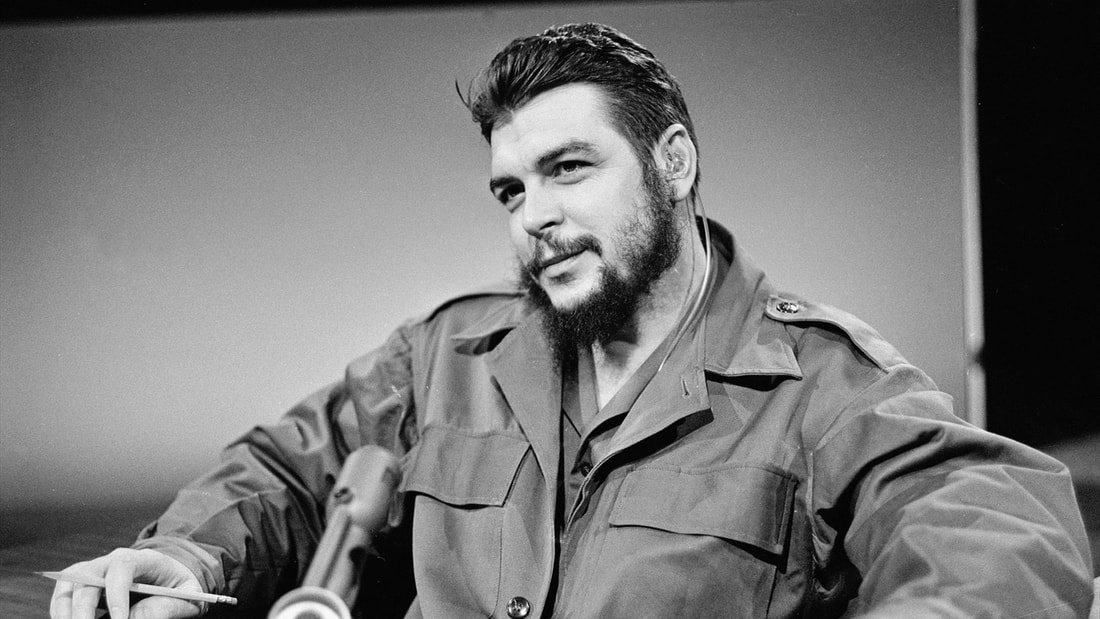That's the reason why we aren't talking about either of those things on this post. Instead, we wish to use this weekend, the 50th year since Guevara's physical disappearance from this life, to highlight the reasons why he continues to be missed. If you truly understand the struggles of colonized peoples, and most people don't - even many folks within colonized communities - then you know that one of the most important tasks within that struggle is to deconstruct the aura of invincibility that imperialism has erected in front of us. This is a critical step for us because until that aura is defeated, we will continue to believe that we cannot touch imperialism. And, since much of the mystique that imperialism holds over us is the belief that we are inferior, touching imperialism is something we have to do. There are not many people who touched imperialism like Che Guevara. His entire life was a series of thumbing his nose at the worldwide capitalist classes. He did that as a very young man when he witnessed the illegal U.S. overthrow of the democratically elected Arbenz government in Guatemala in 1954. Che's response to that trauma was to enlist himself in the struggle of resistance in that country. It was his developing activities in that area that caused him to land in jail in Mexico City where imperialism carelessly imprisoned him with Fidel Castro and that initial group of Cubans that would sail the Granma and help launch the Cuban revolution. Guevara thumbed his nose at the establishment by ignoring imperialism's colonial imposed borders. He respected the Cubans and their mission so the fact he was born and raised in Argentina did nothing to prohibit him from asking Fidel if he could join his effort to liberate Cuba. Guevara understood that a liberated and socialist Cuba would serve as a launching pad for revolution throughout the Americas, including Argentina.
Guevara, disregarding the establishment again, dismissed his formal medical training as a doctor to enlist in the working class struggle for revolution in Cuba. Once the Cubans were victorious in 1959, Guevara had earned his place among the Cuban revolutionary decision makers. During the 1962 event entitled "the missiles of October" Che again showed imperialism no deference, openly responding to every U.S. threat of nuclear weapons with one of his own. No matter how imperialism continues to spin that one, we are convinced that Che's militant stance during that time, and the Soviet and U.S. decision maker's realization that Che's influence was as dominant as Fidel and anyone else's, contributed as much as anything else to the U.S. backing down and agreeing to remove the missiles in Turkey in order for the Soviets to take down the missiles in Cuba.
Just two short years later, Che, representing Cuba as its Minister of Interior, gave his historic "one, two, three Vietnams" speech to the United Nations. His confident and confrontational demeanor in the midst of open intimidation by the U.S. delegation, is classic in itself, but the American efforts to discredit him there and the popular support he received at that UN session spoke volumes about the level of respect he enjoyed across the globe.
Che's military missions in Central Africa were further efforts to challenge imperialism and even at the point where he was captured in Bolivia on October 8th, 1967, demonstrated that the Bolivian government, puppets to U.S. economic interests, as well as the American Central Intelligence Agency, U.S. military, and the Johnson presidential administration, were as much offended that Guevara would even attempt to help lead a military excursion in Bolivia as they were elated that they had finally captured the mysterious and elusive military commandante.
Its our position that Che's courage, confidence, and strong sense of justice, even in the face of death, is the reason he is still so widely respected and why he has achieved even iconic status 50 years after his death. In fact, his image is as memorable as those of the most well known celebrities like Marilyn Monroe, Muhammad Ali, or Elvis Presley. Imperialism will never understand why he remains so popular because it continues to believe its own propaganda, but one thing they do know is they must do whatever they can to discredit him because he was the living, and dead, embodiment of resistance against its interests.
Today, his daughter serves as one of Cuba's chief medical officers and his son is one of the country's most respected artists. His son in fact was very eloquent in speaking up about the Cuban people's commitment to continuing to build socialism despite any efforts to normalize relationships with the U.S. Aleida March, Che's widow, continues to advance the cause of socialism in Cuba. And, 50 years later, people like me wake up everyday attempting to figure out how we can best emulate Che's shining example. Kwame Nkrumah, writing a letter to Julia Wright in 1969 (the daughter of author Richard Wright) mentioned to her that Che spent two weeks in Ghana with Nkrumah before the latter's government was overthrown by imperialism. Nkrumah wrote that he knew that Che would die in battle because of Guevara's intense commitment to justice and his absolute stubbornness about never asking his combatants to engage battle and danger before he did. In today's language, Che Guevara had heart. And, imperialism discredits him because they don't want you and me to be inspired to have his same level of heart against them. On this 50th weekend since Che's death, I'm thinking how we can prove them wrong. What are you doing?


 RSS Feed
RSS Feed
